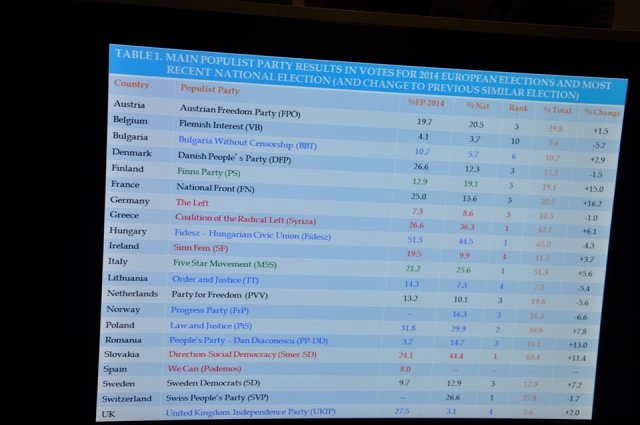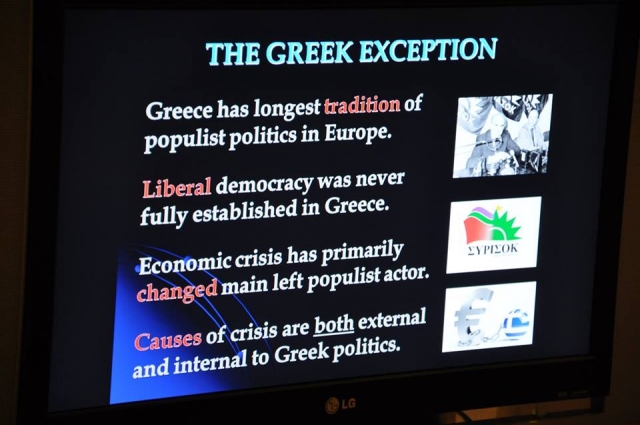Photo: qz.com
Anastasia Balezdrova
"Greece has the longest tradition of populism in Europe and SYRIZA has replaced PASOK on the political stage because of the crisis. In fact, the radical left is following the path that PASOK paved for populism, mostly through the clientelist relationships that it created."
This is how Assistant Professor of Political Science at the Faculty of Public and International Affairs at the University of Georgia Cas Mudde described the rise of populism in Greece during the presentation of his book "Populism in Europe and America - a threat or a challenge for the democratic system" in Athens.
Mudde defines populism as an ideology that divides society into two homogenous and antagonistic groups - "the pure people" on the one hand and "the corrupt elite" on the other, and argues that politics must be the work of the common will of the people.

Photo: bookia.gr
He believes that one of the main reasons for the establishment of populism in Greece is the fact that liberal democracy was never established in the country. "According to the populists, all are the same and people are one single thing. Similarly, the elite are unique and corrupt. From the moment that people are united and share the same will, we can assume that populism is in support of democracy as it is based on the principle of majority. However, it is strongly opposed to liberal democracy, because it protects the rights of minorities."
Mudde explained that the elite in a liberal democracy put some questions over the majority and do not include them in the election debate. However, majority is the most important for populists.
On the other hand, populism can be both left and right, depending on the ideology of "the enemy". "Populism cannot exist as a single ideology and the reason is that it cannot provide answers to many questions. Therefore, most populists combine it with other ideologies. Those of the left wing combine it with socialism and those of the right with nationalism," said Mudde.
He drew a map of populism in Europe as follows, "Left populism covers southern Europe and right northern Europe, but with a lot of exceptions." Populist parties are popular in many European countries and the election results prove it. Populist parties received 17% of the vote of European citizens at the European elections last year. The list of populist parties in Europe, in his opinion, is the following:

Photo: bookia.gr
"There is an upward trend in favour of populist parties but most of them swell and shrink very quickly," said the political scientist, adding that there are many differences among them.
Populists are in power in six European countries, and have the majority of votes in three others. Greece, however, is unique for the peculiar fact that it is ruled by a coalition of two populist parties - one is a representative of left wing populism and the other of right wing populism. At the same time, Cas Mudde stressed that Golden Dawn is not a populist but an anti-democratic and neo-Nazi party and said that populism can exist only within a political establishment.
He believes that the increased popularity of populist parties in Europe is due to the presence of very serious issues that the elite cannot solve, namely immigration and European integration. "The cause does not lie in globalization but in the European Union. It imposes limitations on governments and the countries are with limited potential. Populists in turn "sell" the idea that they can overcome these limitations. An example of this is the policy of SYRIZA that Greece can stay in the European Union without applying the Memorandum of financial assistance."
According to Mudde, successful populist parties have at least one successful "product" which may be the leader, propaganda or even the overall organization of the party. In addition, the media have a more positive attitude towards them because the majority of them are private and their aim is profit. "It is very difficult to "hide" events in today's era. Traditional media no longer hold the "sceptre" and they are forced to follow the smaller ones that distribute content via the Internet. An indicative example is the movement Occupy Wall Street. Although it was not as widespread as The Discontented in Greece and Indignados in Spain, its presence on the social networks activated the far left currents, then the left traditional media, the liberal media and finally all. And despite the variety of the participants in the current, it entered the public consciousness as a united movement. In the 1980s such an event could easily be ignored."

Photo: bookia.gr
Cas Mudde pointed out that one of the most serious consequences from the ruling of populist parties is that they weaken the power of independent institutions such as courts and make executive power almighty. "It happens in a totally democratic way. The state is polarized, the government appoints close people everywhere, arguing that it has been elected by the majority and that it is doing those things for which it has supported it. Since judges and magistrates are not elected they should not interfere with the democratically elected government."